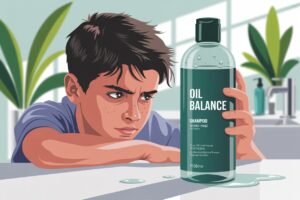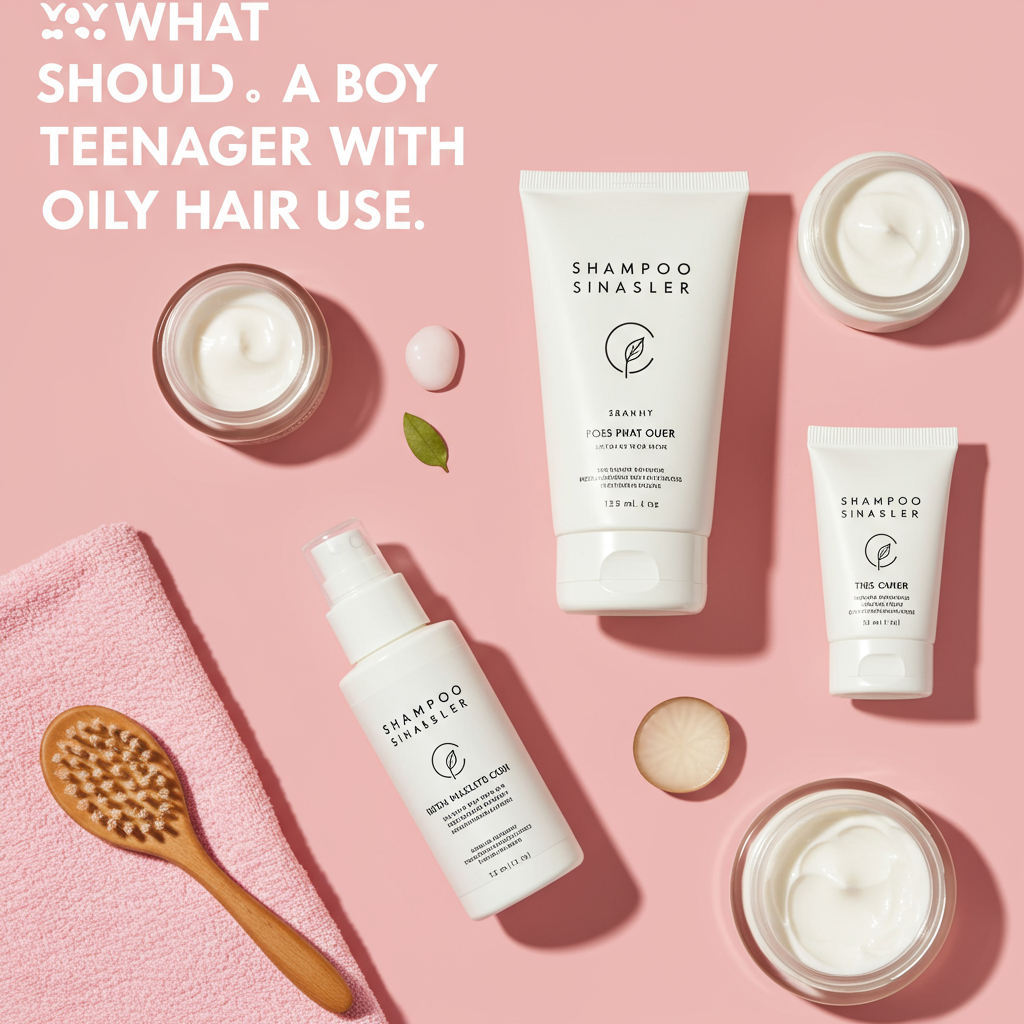Ah, the teenage years! A time of rapid growth, exciting changes, and for many, an unwelcome guest: oily hair. If you’re a teenage boy, or the parent of one, constantly battling greasy strands that seem to appear just hours after washing, you’re certainly not alone. Hormonal shifts during puberty often kick sebaceous glands into overdrive, leading to an excess production of sebum. This translates to shiny, heavy, and sometimes unmanageable hair, which can be frustrating and impact self-confidence.

The good news? You don’t have to live with a perpetually greasy scalp. The key lies in understanding your hair and choosing the right products and routine. In this comprehensive guide, we’ll dive deep into what shampoo should a boy teenager with oily hair use, exploring effective ingredients, optimal washing techniques, and practical lifestyle tips. Get ready to transform those oily woes into fresh, clean, and confident hair!
Understanding Oily Hair in Teenagers: Why Does It Happen?
Before we pinpoint what shampoo should a boy teenager with oily hair use, it’s crucial to understand the root cause of this common issue. The primary culprit behind oily hair is increased sebum production. Sebum is a natural, waxy oil produced by glands in your skin, including your scalp. It’s essential for keeping hair and skin moisturized and protected. However, during adolescence, a surge in androgens (male hormones) can signal these glands to produce significantly more sebum than necessary.
Here are the main factors contributing to oily hair in teenage boys:
- Hormonal Changes: Puberty triggers a rollercoaster of hormones, primarily androgens, which directly stimulate the sebaceous glands to produce more oil. This is the most significant factor.
- Genetics: If your parents or close relatives have oily skin or hair, there’s a higher chance you might inherit this predisposition.
- Lifestyle Factors: While not direct causes, elements like diet, stress levels, and even certain hair products can sometimes exacerbate existing oiliness.
- Hair Type: Fine, straight hair often appears oilier faster because sebum can travel down the hair shaft more easily and cover more surface area compared to curly or thick hair.
Understanding these underlying factors is the first step in selecting the most effective shampoo for a boy with an oily scalp and developing a suitable hair care routine.
Key Ingredients to Look For in a Shampoo for Oily Hair
When you’re trying to figure out what shampoo should a boy teenager with oily hair use, the ingredient list is your most valuable resource. Look for formulations designed to cleanse thoroughly without completely stripping the scalp, which can paradoxically lead to *more* oil production as the scalp tries to compensate. Here are some powerhouse ingredients to seek out:
Salicylic Acid
Often found in acne treatments, salicylic acid is an excellent ingredient for the scalp. As a beta-hydroxy acid (BHA), it exfoliates the scalp, breaking down excess oil and dead skin cells that can clog pores and contribute to greasiness. It helps to deep clean and prevent buildup, promoting a healthier scalp environment.
Tea Tree Oil
A natural antiseptic and antifungal, tea tree oil is a fantastic ingredient for oily and potentially irritated scalps. It helps to regulate oil production, reduce inflammation, and combat any bacteria or yeast that might contribute to scalp issues, itching, or odor.
Zinc PCA
Zinc PCA is a powerful sebum-regulating agent. It works to control oil production directly at the source, offering a mattifying effect and reducing shine without overly drying out the scalp. It’s often found in balancing formulas.
Clay (e.g., Kaolin, Bentonite)
Natural clays like kaolin or bentonite clay are renowned for their absorbent properties. Shampoos containing these clays can effectively draw out impurities, excess oil, and product buildup from the scalp and hair, leaving it feeling cleaner, lighter, and refreshed.
Sulfates (Use with Caution)
While often a controversial ingredient, sulfates (like Sodium Laureth Sulfate or Ammonium Laureth Sulfate) are highly effective cleansing agents. For very oily hair, a shampoo with sulfates can provide the deep clean needed to cut through stubborn grease and heavy product buildup. However, if your scalp is sensitive or prone to dryness, opt for sulfate-free alternatives or use a sulfate-containing shampoo less frequently.
Menthol or Peppermint Oil
These ingredients provide a refreshing, tingling sensation on the scalp and can help stimulate circulation, contributing to a clean and invigorating feel. They also possess mild antiseptic properties that can benefit an oily scalp.
Ingredients to Avoid or Use Sparingly
Just as important as knowing what to look for is understanding what to avoid when choosing what shampoo should a boy teenager with oily hair use. Certain ingredients can weigh down hair or exacerbate oiliness:
- Heavy Oils and Butters: Ingredients like coconut oil, argan oil, shea butter, or excessive amounts of other rich nourishing oils are fantastic for dry or damaged hair but can easily weigh down oily hair and exacerbate greasiness.
- Silicones: While they can make hair feel smooth and shiny initially, silicones (e.g., dimethicone, cyclomethicone) can build up on the hair shaft over time, trapping oil and leading to a dull, heavy, and greasy appearance. Look for “silicone-free” options if your hair feels perpetually weighed down.
- Overly Moisturizing Shampoos: Shampoos marketed specifically for “dry,” “damaged,” or “color-treated” hair are typically too rich and hydrating for an oily scalp and should be avoided.
- Excessive Fragrances and Dyes: If your scalp is also sensitive, itchy, or prone to irritation, artificial fragrances and dyes can sometimes be triggers. Opt for fragrance-free or naturally fragranced options.
Washing Routine: More Than Just the Shampoo
Choosing the right shampoo is only half the battle; the other half is your washing technique and overall routine. Here’s how to optimize your wash for a less greasy outcome:
- Frequency: This is a common dilemma. While it might seem counterintuitive, washing too frequently (multiple times a day) can sometimes strip the scalp of its natural oils, prompting it to produce even more sebum to compensate. Start with washing daily or every other day. If your hair still gets very greasy quickly, try to extend it to every two days, using a dry shampoo on off-days if needed to absorb excess oil.
- Water Temperature: Use lukewarm water. Hot water can stimulate sebaceous glands, potentially increasing oil production, while cold water might not effectively rinse out product.
- Lather and Massage: Apply a small amount of shampoo (about a quarter-sized dollop) primarily to your scalp, not just the hair ends. Gently massage your scalp with your fingertips (avoid using nails!) for 1-2 minutes to lift dirt, oil, and product buildup. Focus on the scalp where the oil originates.
- Rinse Thoroughly: This step is crucial. Any leftover shampoo residue can weigh down hair, make it feel heavy, and contribute to it looking greasy faster. Rinse until your hair feels truly clean and free of suds.
- Conditioner (Use Sparingly): If you use conditioner, apply it only to the mid-lengths and ends of your hair, completely avoiding the scalp. Choose a lightweight, oil-free conditioner specifically designed not to weigh hair down. Rinse it out completely until no slippery feeling remains.
- Pat Dry, Don’t Rub: Aggressive towel drying can stimulate oil glands and cause frizz. Gently pat your hair dry with a soft towel instead of vigorously rubbing.
Lifestyle Tips for Managing Oily Hair
Beyond finding what shampoo should a boy teenager with oily hair use, certain lifestyle adjustments can significantly help manage greasiness and improve overall hair health.

- Avoid Over-Brushing: Brushing your hair excessively can distribute oil from the scalp down the hair shaft, making it appear greasier. Brush only when necessary to detangle or style.
- Hands Off: Constantly touching your hair transfers oils and dirt from your hands to your strands, contributing to greasiness. Try to keep your hands out of your hair as much as possible.
- Clean Hair Tools: Regularly clean your brushes, combs, and any hats you wear. These items accumulate oil, sweat, and product residue, which can then be transferred back to your clean hair.
- Pillowcases: Change your pillowcase frequently (at least once a week). It collects oil, sweat, and product buildup from your hair and skin, which can transfer back to your clean hair while you sleep.
- Diet and Hydration: While direct links are still debated, a balanced diet rich in fruits, vegetables, and lean proteins, along with adequate hydration, supports overall skin and hair health. Limiting highly processed foods and excessive sugar might also be beneficial for some.
- Stress Management: Stress can sometimes trigger hormonal responses that increase oil production in the skin and scalp. Finding healthy ways to manage stress (e.g., exercise, hobbies, meditation) can be beneficial for overall well-being, including hair health.
Recommended Products: What Shampoo Should A Boy Teenager With Oily Hair Use
To further assist you on your quest for fresh, clean hair, here are some highly-rated shampoo options popular among those with oily hair, suitable for teenage boys. Remember to read reviews and choose based on your specific needs (e.g., presence of dandruff, sensitive scalp, preference for natural ingredients).
Neutrogena T/Gel Therapeutic Shampoo (for Oily Scalp)
A dermatologist-recommended formula that effectively controls excess oil, flaking, and itching often associated with oily scalp conditions. Contains salicylic acid to help exfoliate and deep clean.
Paul Mitchell Tea Tree Special Shampoo
Infused with natural tea tree oil, peppermint, and lavender, this shampoo invigorates the scalp with a refreshing tingle while deep cleaning and removing impurities, leaving hair refreshed and manageable.
Maple Holistics Degrease Shampoo for Oily Hair
Formulated with natural ingredients like lemon, rosemary, and cypress oils, this shampoo aims to balance scalp oils without harsh chemicals, promoting a healthier and less greasy scalp environment.
Head & Shoulders Deep Clean for Oily Scalp
If dandruff is also a concern alongside oiliness, this shampoo offers a powerful deep cleanse to tackle both issues, leaving your scalp feeling fresh, purified, and free from flakes.
L’Oreal Paris Elvive Extraordinary Clay Shampoo
This shampoo utilizes a unique blend of 3 refined clays to purify oily roots for up to 48 hours while simultaneously hydrating dry ends, offering a balanced approach for combination hair types.
FAQ: Your Oily Hair Questions Answered
Q: How often should a teenage boy with oily hair wash his hair?
A: Most teenage boys with oily hair benefit from washing daily or every other day. If you wash daily and still experience extreme oiliness, try using a specialized shampoo and focusing on proper rinsing. Over-washing can sometimes strip the scalp of its natural oils, prompting it to produce even more sebum, so pay attention to how your hair reacts.
Q: Does conditioner make oily hair worse?
A: If applied incorrectly or if using a heavy formula, yes. Heavy conditioners or applying conditioner directly to the scalp can exacerbate oiliness. The trick is to use a lightweight, oil-free conditioner and apply it only to the mid-lengths and ends of your hair, completely avoiding the scalp. Rinse it out thoroughly.
Q: Can diet affect oily hair in teenagers?
A: While there’s no direct scientific consensus that specific foods definitively cause oily hair, a balanced diet rich in vitamins, minerals, and essential fatty acids is crucial for overall skin and hair health. Some anecdotal evidence suggests that excessive consumption of highly processed foods, high sugar, or unhealthy fats might contribute to skin and scalp oiliness for some individuals. Focusing on whole foods, fruits, and vegetables is always a good approach.
Q: Are sulfate-free shampoos better for oily hair?
A: Not
